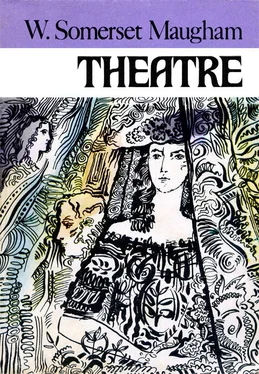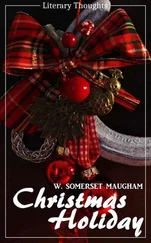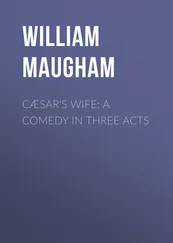Your affectionate son, ROGER.
Julia smiled at the formal way in which he wrote; she was tickled because he was so grown up as to try to get jobs for his girl friends. Then she suddenly remembered who Joan Denver was. Joan and Jill. She was the girl who had seduced poor Roger. Her face went grim. But she was curious to see her.
‘Is George there?’ George was the doorkeeper. Evie nodded and opened the door.
‘George.’
He came in.
‘Is the lady who brought this letter here now?’
‘Yes, miss.’
‘Tell her I’ll see her after the play.’
She wore in the last act an evening dress with a train; it was a very grand dress and showed her beautiful figure to advantage. She wore diamonds in her dark hair and diamond bracelets on her arms. She looked, as indeed the part required, majestic. She received Joan Denver the moment she had taken her last call. Julia could in the twinkling of an eye leap from her part into private life, but now without an effort she continued to play the imperious, aloof, stately and well-bred woman of the play.
‘I’ve kept you waiting so long I thought I wouldn’t keep you till I’d got changed.’
Her cordial smile was the smile of a queen; her graciousness kept you at a respectful distance. In a glance she had taken in the young girl who entered her dressing-room. She was young, with a pretty little face and a snub nose, a good deal made-up and not very well made-up.
‘Her legs are too short,’ thought Julia. ‘Very second-rate.’
She had evidently put on her best clothes and the same glance had told Julia all about them.
(‘Shaftesbury Avenue. Off the nail.’)
The poor thing was at the moment frightfully nervous. Julia made her sit down and offered her a cigarette.
‘There are matches by your side.’
She saw her hands tremble when she tried to strike one. It broke and she rubbed a second three times against the box before she could get it to light.
(‘If Roger could only see her now! Cheap rouge, cheap lipstick, and scared out of her wits. Gay little thing, he thought she was.’)
‘Have you been on the stage long, Miss—I’m so sorry I’ve forgotten your name.’
‘Joan Denver.’ Her throat was dry and she could hardly speak. Her cigarette went out and she held it helplessly. She answered Julia’s question. ‘Two years.’
‘How old are you?’
‘Nineteen.’
(‘That’s a lie. You’re twenty-two if you’re a day.’) ‘You know my son, don’t you?’
‘Yes.’
‘He’s just left Eton. He’s gone to Vienna to learn German. Of course he’s very young, but his father and I thought it would be good for him to spend a few months abroad before going up to Cambridge. And what parts have you played? Your cigarette’s gone out. Won’t you have another?’
‘Oh, it’s all right, thanks. I’ve been playing on tour. But I’m frightfully anxious to be in town.’ Despair gave her courage and she uttered the speech she had evidently prepared. ‘I’ve got the most tremendous admiration for you, Miss Lambert. I always say you’re the greatest actress on the stage. I’ve learnt more from you than I did all the years I was at the R.A.D.A. My greatest ambition is to be in your theatre, Miss Lambert, and if you could see your way to giving me a little something, I know it would be the most wonderful chance a girl could have.’
‘Will you take off your hat?’
Joan Denver took the cheap little hat off her head and with a quick gesture shook out her close-cropped curls.
‘What pretty hair you have,’ said Julia.
Still with that slightly imperious, but infinitely cordial smile, the smile that a queen in royal procession bestows on her subjects, Julia gazed at her. She did not speak. She remembered Jane Taitbout’s maxim: Don’t pause unless it’s necessary, but then pause as long as you can. She could almost hear the girl’s heart beating and she felt her shrinking in her ready-made clothes, shrinking in her skin.
‘What made you think of asking my son to give you a letter to me?’
Joan grew red under her make-up and she swallowed before she answered.
‘I met him at a friend’s house and I told him how much I admired you and he said he thought perhaps you’d have something for me in your next play.
‘I’m just turning over the parts in my mind.’
‘I wasn’t thinking of a part. If I could have an understudy—I mean, that would give me a chance of attending rehearsals and studying your technique. That’s an education in itself. Everyone agrees about that.’
(‘Silly little fool, trying to flatter me. As if I didn’t know that. And why the hell should I educate her?’) ‘It’s very sweet of you to put it like that. I’m only a very ordinary person really. The public is so kind, so very kind. You’re a pretty little thing. And young. Youth is so beautiful. Our policy has always been to give the younger people a chance. After all we can’t go on for ever, and we look upon it as a duty we owe the public to train up actors and actresses to take our place when the time comes.’
Julia said these words so simply, in her beautifully modulated voice, that Joan Denver’s heart was warmed. She’d got round the old girl and the understudy was as good as hers. Tom Fennell had said that if she played her cards well with Roger it might easily lead to something.
‘Oh, that won’t be a for a long while yet, Miss Lambert,’ she said, her eyes, her pretty dark eyes glowing.
(‘You’re right there, my girl, dead right. I bet I could play you off the stage when I was seventy.’)
‘I must think it over. I hardly know yet what understudies we shall want in our next play.’
‘I hear there’s some talk of Avice Crichton for the girl’s part. I thought perhaps I could understudy her.’
Avice Crichton. No flicker of the eyes showed that the name meant anything to Julia.
‘My husband has mentioned her, but nothing is settled yet. I don’t know her at all. Is she clever?’
‘I think so. I was at the Academy with her.’
‘And pretty as a picture, they tell me.’ Rising to her feet to show that the audience was at an end, Julia put off her royalty. She changed her tone and became on a sudden the jolly, good-natured actress who would do a good turn to anyone if she could. ‘Well, dear, leave me your name and address and if there’s anything doing I’ll let you know.’
‘You won’t forget me, Miss Lambert?’
‘No, dear, I promise you I won’t. It’s been so nice to see you. You have a very sweet personality. You’ll find your way out, won’t you? Good-bye.’
‘A fat chance she’s got of ever setting foot in this theatre,’ said Julia to herself when she was gone. ‘Dirty little bitch to seduce my son. Poor lamb. It’s a shame, that’s what it is; women like that oughtn’t to be allowed.’
She looked at herself in the glass as she slipped out of her beautiful gown. Her eyes were hard and her lips had a sardonic curl. She addressed her reflection.
‘And I may tell you this, old girl: there’s one person who isn’t going to play in Nowadays and that’s Miss Avice Crichton.’
BUT a week or so later Michael mentioned her.
‘I say, have you ever heard of a girl called Avice Crichton?’
‘Never.’
‘I’m told she’s rather good. A lady and all that sort of thing. Her father’s in the army. I was wondering if she’d do for Honor.’
‘How did you hear about her?’
‘Through Tom. He knows her, he says she’s clever. She’s playing in a Sunday night show. Next Sunday, in point of fact. He says he thinks it might be worth while to go and have a look-see.’
‘Well, why don’t you?’
Читать дальше











